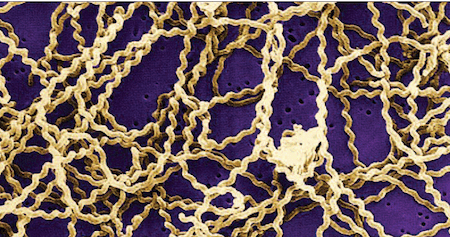
Have you Heard about the Terrible Bacteria Affecting our Sea Lion Population? Did you Know that Same Bacteria are Attacking our Dogs!
By Dr. Nichole Brooks, DVM

Have you heard about the terrible bacteria affecting our Sea Lion Population? Did you know that same bacteria are attacking our dogs!
The bacteria is called Leptospirosa, and we often refer to it as lepto or leptospirosis. This is a contagious and life threatening bacteria that causes a severe infection and has also been called “Weil’s disease.”

It is considered zoonotic which means it’s contagious to people! The vaccine for this bacteria has been available for many decades, however it has evolved and changed and has new strains.
The reappearance of leptospirosis over the last few years may be due to how much wildlife has become part of our lives even in our urban areas. The animals most commonly identified carrying this are small rodents, raccoons, foxes opossums, skunks, deer, mountain lions and of course sea lions. In addition to wild animals some of our domestic species can carry this too, animals such as pigs, cattle, horses and of course dogs, and humans too!! Unlike our large cats, our feline fur babies seem to have an incredible resistance to this ugly bacteria.
It can be hard sometimes to identify a sick animal. This bacteria does not make every animal sick. Some can carry this bacteria and shed it in their urine infecting other animals, while remaining symptom free. Animals are often infected with this bacteria by ingesting contaminated urine, soil, water or grass. It can also be contracted from mother to offspring and sometimes bite wounds. It is most common during the spring and fall when we have some rainfall and the temperature is moderate, but in areas like Aptos we see cases year round. It can survive for 180 days in a moist or wet environment.
The symptoms of leptospirosis can be vague and difficult to identify. Symptoms often develop within 1 to 2 weeks of exposure. The symptoms can include, but are not limited to, the following: fever, vomiting, loss of appetite, conjunctivitis, muscle pain, stiff gait, and weakness. Once infection is established and the animal is sick many patients develop progressive or acute kidney disease and sometimes liver failure. After the illness has progressed patients will have clinical signs of kidney and liver failure. These clinical signs include marked dehydration, decreased to no urine production with an abnormal appearance to the urine, severe gastrointestinal disease including vomiting and diarrhea, jaundice, breathing difficulty and even death.
That all sounds really bad and it is! So what do we do about it? Early detection and early treatment is often the answer. Initiation of appropriate antibiotics and aggressive supportive care is key to helping an animal survive. Hospitalization is also recommended. Many patients require an intensive care unit designed to treat contagious zoonotic diseases. Dialysis to save or supplement kidney function may also be needed to save their life.
The outcome and prognosis depends on at what point we diagnosis this illness. If we make the diagnosis early before there is major organ failure, many dogs (around 80%) will leave the hospital with mild to moderate kidney disease. This can adjust back to normal in the few months following.
How do stop the spread of this terrible bacteria? Vaccines are always recommended, but do not guarantee immunity. There up to 10 strains (serovars) of leptospirosis and we only have vaccines for 4 of them. With vaccines we can increase survival from the following serorvars: grippotyphosa, canicola, icterohemorrhagicae, pomona. The vaccine needs to boostered yearly and for high risk animals it can be given every 6 months. To kill this bacteria use bleach or dry the environment. Also prevent wildlife in your yard or in areas your pets play. Leptospirosis is an extremely toxic disease and we should all know about it in this area. Over a hundred people are infected with leptospirosis every year. Fortunately, we only see 5 to 10 cases a year, but there is growing concern with our Sea Lions becoming infected and therefore exposure for beach dogs. With the past drought years and our desire to live in more rustic and rural areas wildlife becomes a regular part of our day. Just remember that most wildlife does not receive healthcare, vaccines, flea or tick medicine and can carry a variety of diseases. Wildlife should be revered and respected, but as a guideline try not to interrupt their habitats for their wellbeing, yours and your doggy companions. If you have questions about vaccines or about this terrible illness contact your regular Veterinarian or email me.
Dr. Nichole Brooks, DVM
Del Mar Pet Hospital
Locally owned and operated for over 50 years!
(831) 688-2016
7525 Sunset way, Aptos


You May Also Like

Embers, Sparks, and Fireworks…What You Can Do to Improve Your Home’s Safety
July 1, 2019
Summer School of Rock
July 1, 2019

